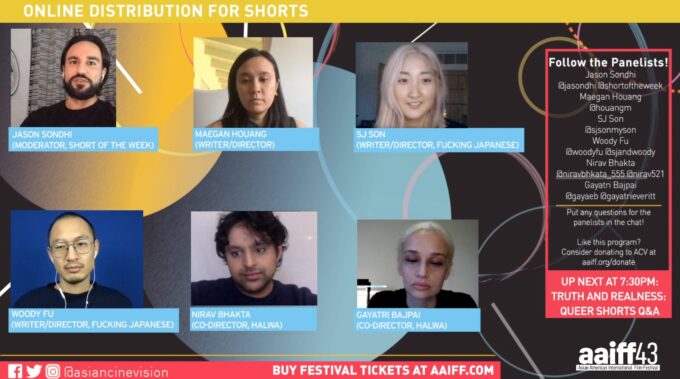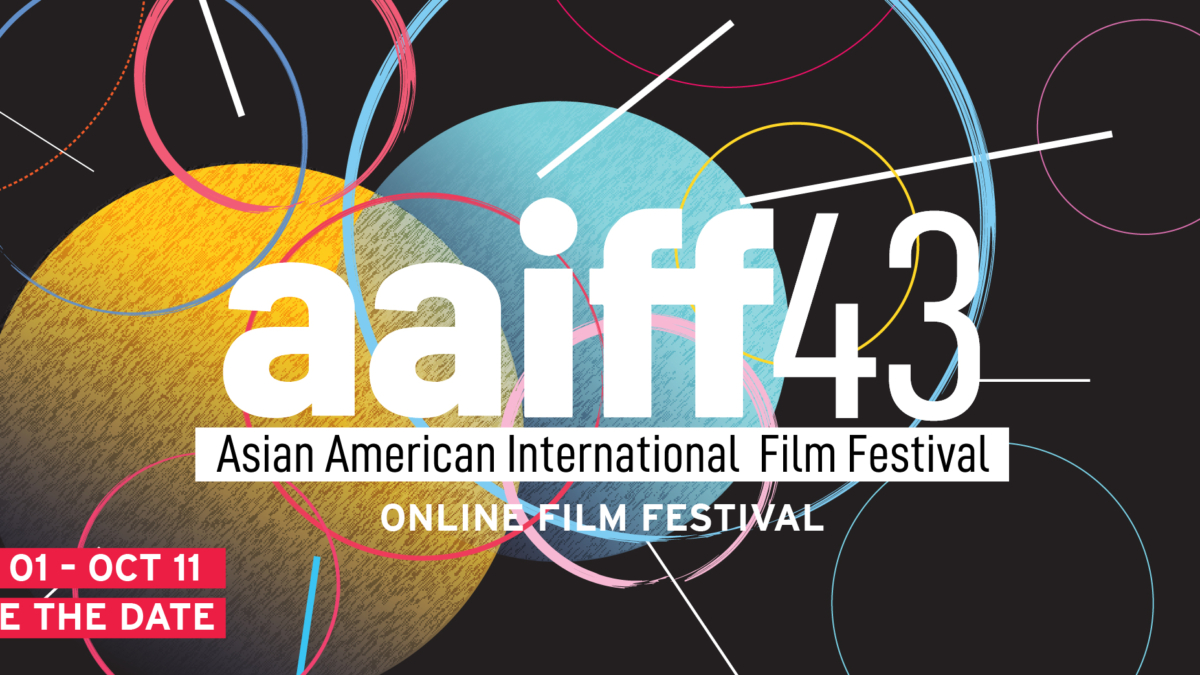Written By: Huizhu Pan
Many filmmakers deem short films as the stepping stone to features or potential opportunities in the industry. At the same time, some may wonder how to connect their works with other people amidst the emergence of multiple digital platforms. Saturday evening’s AAIFF virtual panel invited several artists to share their distinctive insights and experiences with online distribution for shorts.
The panel is hosted by Jason Sondhi, co-founder of the influential website Short of the Week. And it includes Maegan Houang, writer and director of the short film “In Full Bloom,” Nirav Bhakta and Gayatri Bajpai, co-directors of the award-winning short film Halwa (streamed on HBO) and SJ Son & Woody Fu, writer-directors of the comedy short “Fucking Japanese.”
Talking about the role of online distribution and the Internet in their professional development, the panelists agree that it’s a great way to get their works seen. As a music video director, Houang used to use online platforms like Vimeo a lot. “Online distributing enables people to share the work if they like it. And more people will watch your works if others think it’s good,” Houang said. For her, the Internet can be a way to get validation from audiences. Adding on that, Bhakta thinks it also leads to social impact, either for self-promotion or for the work’s exposure. But he notes, “There is no specific way of distribution. Everyone has their process [depending on different focuses] since there are so many platforms out there with various interests.”
Besides online platforms, social media is another effective way to reach out to audiences and professionals. Speaking as an individual on social media can help gain more interaction and feedback. According to Bajpai, “Most people reached out when we posted as ourselves, sharing how we felt about the film we’ve made and what we were trying to say.”
Starting with posting sketch videos with strong and funny subjects online, SJ Son and Woody Fu said they created their works for an Internet audience. Fu said, “People coming up reaching out to you through social media is equivalent to the person to person communication on a live stage.” But it is also worth noting that “The goal is not to post something online that would impact the rest of our life. The goal is we are driven to make that thing [by passion] and connections with our audiences,” Fu added. During the process, they gained validation from loyal fan-based relationships and tastemakers who helped amplify their audiences.

The panelists also shared their strategies to spread words and build relationships with vendors when getting something released online. Although it can be a slow tide, they’ve all sent cold emails to cohorts. Son talked about her experience a few years ago of sending Twitter DMs to Phil Yu, creator of “Angry Asian Man,” who is her role model for being the first in the space to promote Asian content. Yu retweeted one of her shorts, and that became her kick-starter. Additionally, Houang mentioned the key is not to be afraid of getting rejected and just to put yourself out there, reaching out to people when you know there will be magazines or blogs going out.
Not so much as a social media person, Bhakta shared some useful tips on how to get prepared for opportunities. “Our tactics sound a bit ‘old-school,’ but it’s practical. You have to let people know what you have to offer. For example, when reaching out to the HBO PR marketing team, we tell them why our film is important: since it will be the first South Asian short film on the platform,” he said. “And when emailing our pitch to people on our contact lists, we make a package through Google Drive, covering materials like our biography, trailer, screener and poster, making it easy to be accessible.”
Given that most film festivals are going online this year, the guest speakers talked about online distribution versus physical festivals. Fu prefers festivals as the audiences are more responsive in a room than in a virtual space where everything becomes abstract. And he also thinks festivals are essential places to exchange information with professionals. Yet, Houang enjoys online festivals since there is no need to take off from work. As for premiere preference, Houang emphasized: “Different films should have different paths.” Some people think it’s better to gather some online interpretations of their works before going to the festival route. Others believe attending festivals to attract potential online platform marketing teams can work as well.
Sondhi mentioned a survey they did among filmmakers regarding the reason they pursue online releases, and the top three answers are: To connect with other people and gain feedback, to have potential impact, and to make money. During the panel, audiences asked about the possibilities for shorts filmmakers to make some money back on shorts. Although there are chances to gain profits from digital purchase or revenue share, most panelists agree that “Making money shouldn’t be the priority of your online distribution strategy.”

